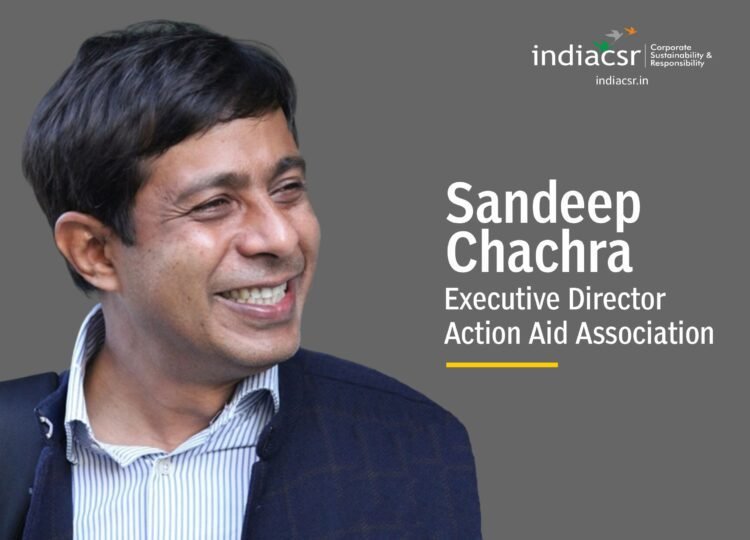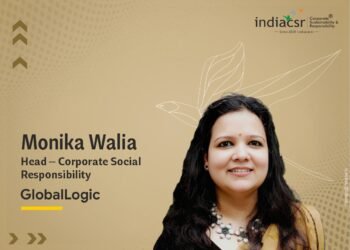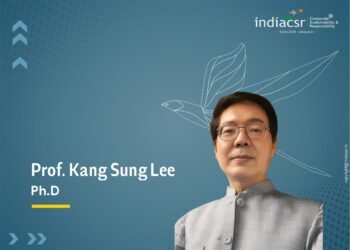India’s rural populations, including indigenous, lower caste, and other diverse groups, face challenges related to land, wages, and social security, and need recognition as frontline climate workers through agroecology.
It is our pleasure to introduce Sandeep Chachra, the Executive Director of Action Aid Association for India CSR, an organization that works towards creating a just and equitable society by empowering marginalized communities. With over 25 years of experience in the development sector, Sandeep has played a pivotal role in promoting sustainable and inclusive development in India. Throughout his career, Sandeep has worked towards addressing social inequalities and promoting social justice through various initiatives. He has also been actively involved in advocating for policy changes and institutional reforms to support marginalized communities.
In this interview, Sandeep will share his insights and experiences on the importance of corporate social responsibility (CSR) in India, and how it can contribute to building a more equitable society. We will also discuss the challenges and opportunities faced by organizations like Action Aid Association in promoting CSR initiatives, and the role of civil society in holding corporations accountable for their social and environmental impact.
ActionAid has completed its 50 years as an organisation, what inspired you to form this organisation, and what were the specific changes you desired while forming the same?
Having spent a large part of my working life in ActionAid Association in India and within the ActionAid federation in countries of Africa and Asia, I must say that the work of ActionAid has shaped me in a substantive measure. The colleagues who work here and, more than that, the communities with whom this organisation works have inspired me, taught me and moulded and strengthened my resolve and quest for justice and equality. ActionAid has been working in India for more than 50 years now. It started in 1972 with interventions in orphanages in West Bengal. Over the decades, the work and the organisation evolved. In the 1980s, we did community development work, then in the 1990s, we adopted a human rights-based approach, and then in the 2000s, we started working within an overall five-year strategy, which continues to date. Work has expanded both geographically and across concerns with which we engaged. In the last decade, I have been part of efforts to expand our work, including the depth and range of issues on which we work on the ground.
Today ActionAid Association has impacted the lives of more than four million vulnerable and marginalised people across 24 states and two union territories. We engage with vulnerable sections of the society, which include informal daily wage workers in urban areas, landless labourers and small farmers in rural areas, Dalit communities, religious minorities, tribal communities, and among them particularly vulnerable tribal groups, pastoralists and nomadic tribes, and denotified tribes – the communities that under the British colonial rule faced the stigma of being criminalised, the effects of which linger on today.
As an established organisation today, what are some tips you would like to give to the newly established ones for faster growth?
When the organisation is in service and solidarity with the most vulnerable and marginalised sections of our land, growth cannot just be a measure of the number of projects, balance sheets and size. It is a measure of the understanding, responsiveness, and quality of effort to those in need. It is a measure of the organisation’s solidarity and action to address the issues faced by people, families and communities in poverty and vulnerability.
Based on our lessons and experience working with vulnerable communities, their leaders and their organisations to promote social and ecological justice, it is critical to promote collaborative, participatory interventions where protagonisms of communities are encouraged and enabled. In addition, it is crucial to work with people in the administration who have the duty to provide public goods and ensure the welfare of vulnerable communities to help ensure they provide these rights and entitlements effectively.
Another lesson we have gained is to work in partnerships – with vulnerable people’s organisations, social organisations, supporters and donors. It is vital to build people’s agency and people’s formations. These organisations continue to extend assertions and win victories even after our association with them has reduced in everyday interaction.
As an organisation that seeks to be a valued partner for all who seek to build a better world, we also need to put ourself under the scanner, and demonstrate an organisational culture that ensures equal opportunity for every person, irrespective of caste, class, race, age, gender, sexual orientation, colour, disability, location and religion.
While working for the betterment of the nation, I am sure you would have come across many strengths and weaknesses of India. Can you state some on which the nation needs to work?
India has witnessed many achievements in its history – as a civilisation, in its freedom struggle and all the significant accomplishments after Independence. At a time when almost every country across Asia, Africa and Latin America has witnessed military dictatorships, Indian democracy has never faltered, despite a few challenges, especially in 1975. The Indian economy demonstrates a healthy diversification across all sectors with a strong base, and our control over financial systems has helped us weather crises that have overwhelmed other economies. We have gained significant advances in poverty alleviation, and hunger and famine are now crises of the past. We have an extensive welfare system in place, and our recent survey of informal workers during COVID-19 shows that the PDS was the source of rations for most of our respondents.
A more significant source of strength is the people of India. The diversities of people can be seen in faith, languages, and ways of living; these lived wisdoms are a great resource. At ActionAid Association, our core belief is in the power of positive and sustainable change that lies in the hands of vulnerable communities, and our attempt always is to enable and support their protagonisms. We believe our diversities and our people are our biggest strengths.
However, we also need to recognise the continuing structures of discrimination and deprivation that many communities and sections face. We need to acknowledge that marginalised communities and minorities, including Dalits, Adivasis, Muslims, women, landless labour, small farmers and informal labour, still struggle for a life of dignity. Gender inequalities continue to be a reality despite strides made in closing the gap in access to essential services and changes in gender norms such as child marriage or son preference. We seek to build on the resilience and capacities of vulnerable communities to enable them to face adversities and build better and equal futures for all through people-led action.
Can you highlight some of the most successful projects that you’ve worked on till now?
We recently completed a project on people dependent on the informal economy that covered 32 cities and 18 districts and ran across 15 states of the country. Over a four-year period ending in 2019, we provided benefits to more than 1,86,000 people. We helped set up 896 collectives of informal workers with a total membership of 43,910 members to help them access social security measures.
During the COVID-19 pandemic in 2020, we provided humanitarian support through rations and hygiene materials to 77 lakh people across 24 states and one Union territory. While the relief support continued in 2021, we extended our intervention to help augment medical services. We helped set up 24 COVID care centres in different states, providing primary care, medicines, testing facilities, counselling services, good hygiene and food and medical facilities or COVID care. Further, we have provided 435 health institutions with over 6,500 oxygen concentrators.
In a project to strengthen administrative and community-led efforts to end bonded labour across six states in India and two provinces in Nepal, we rescued 1,346 bonded labourers. In addition, we activated 19 vigilance committees and set up 259 community-based organisations to protect at-risk populations and rescue bonded labour.
As noticed, many of your projects are based in rural areas. Can you share with us your experience of working there?
India is very diverse. There is a saying in Hindi illustrative of this: “Kos kos par badle paani, char kos par vaani.” So the need for a grounded presence is a must. Thus, having teams at the district level is needed for the best service and response. Local work means having that diversity in our teams, both linguistic and social. The understandings needed is also context specific. In addition, our teams require humility in approach, in which listening to communities and responding to their needs is paramount. Thus rooted work is needed, which means you have to be together and available to people.
Rural populations also have many diversities, including agricultural workers, small farmers, pastoralists, forest dwellers, and fisherfolk. In India, they also comprise a large bulk of indigenous, tribal communities and people from lower caste communities. The issues these communities face include land ownership and access to ecological commons – especially pasturelands, forests and waterbodies, the question of wages and social security for agricultural labour and the prospects of collective enterprise, especially cooperatives. In the context of climate change, there is a growing need to recognise rural populations as frontline climate change workers in mitigation and adaptation processes, taking up the custodianship of ecological resources and providing environmental services primarily through agroecological practices.
What are some future plans you’re thinking of implementing through ActionAid?
We have very ambitious plans for the future. These are based on the learnings we have achieved based on past achievements. We want to expand further by encouraging communities to work with local administrations to protect children from the continuing danger of child labour, child marriage and trafficking, and ensure they get meaningful education.
We want to launch a campaign celebrating women in the world of work, protecting their right to property and encouraging men and boys to share in care work, which continues to fall unfairly on the shoulders of women and girls. We believe that feminist solidarity economies, by which we mean all forms of collective enterprise in the farm and non-farm sector, which is gender-sensitive, can go a long way in easing the crises seen in rural societies.
We want to work to promote dignified work, fair wages, decent working conditions and social security. We would like to explore how we could make the right to work a meaningful right for all. We want to help create collectives of informal workers with feminist leadership, to help workers access social security and create livelihood opportunities and secure the right to the city.
We want to help promote equality, justice and social harmony. We feel that better futures for all can only lie in a world where no one faces the burdens of history and discrimination. Mindful of how our planet has been revealed to be increasingly fragile due to uncontrolled, over-extractive and over-polluting industrial processes, we need to promote the environment and ecosystems as the Global Commons, not just for humankind but for all life on Earth. Finally, recognising how conflict and climate change are making more and more people leave their homes and, in some cases, cross borders, we will campaign to make this world more welcoming of refugees and migrants. As mentioned before, our plans are ambitious. Still, we see them as the need of the hour and provide a strategic vision to help ensure our everyday interventions resonate with a broader goal.
(India CSR)






















